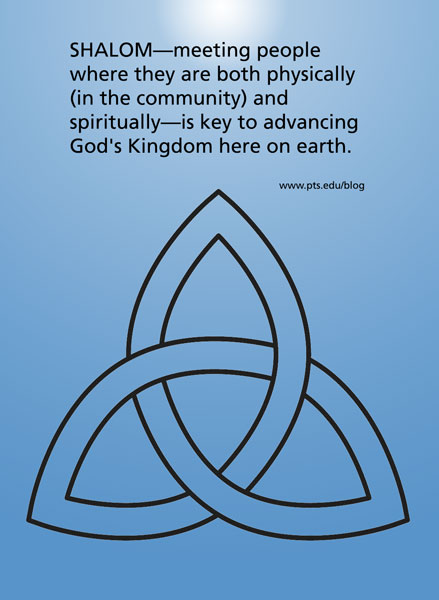On Dec. 3, 2014, church planter Dan Steigerwald presented “Sowing Shalom in Our Own Backyard” at Pittsburgh Theological Seminary. Dan argues that as the Church continues to lose its voice and influence across America, we face a growing urgency to re-engage our neighborhoods and cities. To do this, churches must become adept at growing local missionaries to be agents of God’s shalom. Here April Roebuck reflects on the discussion.
After reading Dan Steigerwald’s book Growing Local Missionaries, I wasn’t sure what to expect as I would get to meet him in person. In his book he shares about being agents of peace. He uses Jeremiah as the premise; more specifically Jeremiah 29:4-7. He asks the reader to imagine being an exiled Jew in a foreign land and God says to stay, build houses, increase in number, seek the peace of the city and as the city prospers you prosper. If we are to settle where we are planted that means that we have to blossom where we are planted. When we look at the text for what it really says, it tells us that it’s not about us but about God. We were created for relationship; relationship with God and relationship with one another to bring glory to God. When we remember that we are agents of God’s peace for the glory of God it changes how we look at the city and the people within it.
Dan uses a Celtic Trinity knot to demonstrate what sowing Shalom looks like. At the top point Dan describes this as the initial step of sowing peace. At this stage we immerse ourselves in the culture and listen to those we meet. I agree with this step but I’d like to push it further to say listen as a means to understand instead of listening to respond or correct. Meeting new people is not difficult. We come in contact with people every day at Starbucks, a gas station, or the waiter at a restaurant. The difficult part is getting out of our comfort zones to speak. If it’s not about us and our uneasiness then seeing someone as God sees them is easy. When we see someone for who they are then can we listen to understand why they are. The bottom right knot is a step toward befriending and connection once we have listened. The first step was to absorb as much information as possible about the surroundings and our new friend. Now we can begin to relate, converse, and share information. This then leads us to the bottom left knot of participating and enriching them as a person. While all of these steps are taking place the center circle is a place of prayer and being led by discernment through the Holy Spirit. The knot is interconnected because it is an unending cycle and practice that then becomes a way of living. What stood out for me in Dan’s presentation was the idea of prophetic living. Prophetic living calls for us to live in obedience to God. It calls for demonstrating the love of Christ to each person we encounter. To live prophetically we need to abandon our need for power and control in order to be filled with the power of God to empower others even if they never profess Christ. Can we be friends with non-Christians? Absolutely! Prophetic living is courageous, so ponder this: What does my life speak?
Active in the new church plant initiative in the Pittsburgh area, April Roebuck is a 2014 graduate of the Master of Divinity program at Pittsburgh Theological Seminary. She is an associate minister at Mount Ararat Baptist Church. “I think sowing Shalom—meeting people where they are both physically (in the community) and spiritually—is key to advancing God’s Kingdom here on earth.”


Shalom, our Brethren of God (Yahweh).
It is good to read your teachings, you preach& teach,after hearing well &read,we left from Roman Catholic church to came to SHAWING SHALOM CHURCH OF ,we came with 3 churches in Kenya & 1 Church in Tanzania.
we have 160 members, 8pastors &25 Children orphans, our brethren are asking for you to come & teacher our brethren & Baptize them.
we are happy to get more from you.
Pastor Charles Owino